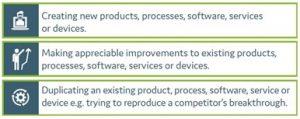R&D Tax Credits: A Q&A with LimestoneGrey
Research and development (R&D) tax credits are a government incentive designed to make innovation easier for startups and SMEs. However, the claim process can be overwhelming and without professional advice, small companies risk losing out on significant cash benefits.
We're therefore delighted to feature Matthew Jones (ACA, CTA) in today's blog, who is the Managing Director of LimestoneGrey, Wales' leading chartered R&D tax credit consultancy. He answers some of your most frequently asked questions, including what activities qualify and if grant funding affects your ability to make a claim.
1. Do I qualify for R&D tax credits?
There are several factors to consider when reviewing a company’s eligibility for R&D tax credits:
-
The company set up
R&D tax credits are a form of corporation tax relief meaning it is only available to limited companies. It can be claimed regardless of whether a company is profitable or loss-making. Unfortunately, sole traders, partnerships of individuals, etc. are not eligible to apply.
-
The timeframe in which the R&D took place
Companies are against the clock to submit an R&D tax credit claim. You have two years from the end of the accounting period where the R&D took place to submit a claim. After this date, the claim will be lost, along with all financial benefits.
-
Evidence of qualifying R&D activity within their projects
The official definition provided by HMRC states ‘R&D takes place when a project seeks to achieve an advance in science or technology through the resolution of scientific or technological uncertainty.’
Most people scratch their head when they read this – so what does it mean in practice?
It is easier to understand if we split the definition into three parts and re-order them:
1. You need a project
This may include any of the following activities:

2. The project needs to contain scientific or technological uncertainties
HMRC will not consider your project's end result. Rather, they will consider the work your project involved and whether you had to overcome any difficult challenges. These challenges should be of a scientific or technological nature.
3. The project seeks to achieve an advance in science or technology
What is science or technology? Basically, it is knowledge. By overcoming the above scientific or technological uncertainties, you would have needed to advance this knowledge. An assessment needs to be made to determine if the solutions to the challenges were:
- Readily deducible by a competent professional in the field
- Available in publicly accessible information
This will determine if the advance in knowledge was solely in your company or industry-wide.
2. What can I claim for?
An R&D tax credit adviser will assess the following categories to identify costs within a qualifying project:
- Consumables (materials, water, light, heat, etc.)
- Payroll costs
- Externally provided workers
- Subcontractors
- Software
- Payments to any clinical trial volunteers
3. How much can I claim?
R&D tax credit relief was created by the Government in 2000 and has continued to get more and more generous since its inception. At present, a qualifying company can claim up to 33p for every £1 spent on qualifying R&D activity.
4. If I’ve received a grant, will that interfere with my ability to make a claim?
It is so important to stress that a company can still gain access to R&D tax credits if they have received a grant. This is one of the biggest misconceptions I hear from companies. The only factor that will be affected is the amount you are entitled to.
5. What should I look for in an R&D tax credit adviser?
It is no secret that HMRC are enforcing a variety of measures to prevent abuse of R&D tax credit relief following the recent identification and prevention of fraudulent attempts totaling over £300 million. Therefore, it is vital that you choose the right adviser as choosing the wrong one can potentially land you in very deep water.
My advice would be to:
-
Firstly, check the supplier’s credentials
R&D tax relief is a complex area of tax law and is not offered as standard by many mainstream accountants as it is not a compliance service. Due to its highly technical nature, it is imperative that your adviser has the necessary qualifications to undertake the work with the highest level of detail and accuracy. Ideally, you should work with a qualified chartered accountant (ACA or ACCA) or, even better, a chartered tax adviser (CTA). Having these qualifications indicates that they have passed the necessary exams and are regulated by professional bodies, enforcing them to follow strict codes of conduct.
-
Investigate the service level available
A full-service consultancy will take you through the entire R&D tax credit journey, from initial consultation to submission and beyond. However, this will not be the case with all suppliers. Some will force you to rely heavily on your own accountant following the preparation of the claim. These advisers tend not to be registered with HMRC and therefore cannot submit claims on your behalf.
-
Learn from others
Check the supplier’s website for any testimonials or case studies providing information on the experiences of other clients. I would recommend browsing their social media channels to see if they have published any good news stories or successes. Social media is also a good place to investigate whether the supplier has existing partnerships or relationships with any reputable organisations that would assure you of their integrity.
-
Get a second opinion
Most consultancies will provide a free no-obligation assessment of your company’s situation and advice on whether they feel it is worth pursuing a claim. I would recommend getting a second opinion as you have nothing to lose.
-
Finally, look out for unusual behaviour
When engaging with an R&D tax credit adviser, I would advise proceeding with caution if any of the following situations occur:
-
- The adviser alludes to the claim value in the initial meeting – it is impossible to say at this early stage without a full analysis.
- The adviser takes a blanket percentage of your employees’ wages to include in a claim – each employee will have spent a different amount of time on the project, so they need to be looked at in isolation.
- An adviser’s fee seems either too high or too low.
- The adviser ties you in with a long-fixed term contract (usually hidden later in the terms of the contract).
About LimestoneGrey
LimestoneGrey is a full service, chartered R&D tax credit consultancy, that is regulated by the ICAEW and CIOT, and only uses qualified professionals to conduct work on behalf of clients.
Funding available to reduce the impact of offshore windfarms on UK air defence
The Defence and Security Accelerator (DASA) has announced Phase 2 of the Windfarm Mitigation for UK Air Defence competition. They will invest up to £3.6 million in innovations that permit the coexistence of offshore windfarms and UK air defence surveillance systems.
Background
Offshore wind is a key feature of the UK’s net zero future. In the 2019 ‘Net Zero’ legislation, the Committee on Climate Change predicted a requirement for at least 75GW of electricity from offshore wind by 2050 (Source: DASA). To achieve this, there will need to be a ten-fold increase in the UK’s current offshore windfarm generation capacity. However, this has the potential to negatively impact military air defence – thus, DASA is seeking innovations to make co-existence possible.
Eligibility
Applicants should recognise that this is the second phase of a multi-phase competition. While you don’t have to have been involved in Phase 1 to apply, you should be aware of the successful projects from the previous competition. In contrast to Phase 1, Phase 2 projects will reach a higher level of maturity. Individual proposals should not exceed £600k and, if successful, all work should be completed by 28th February 2023.
Scope
Proposals should address the challenge of maintaining the effective surveillance of airspace, despite the presence of larger windfarms. DASA is interested in alternative technologies that could fulfill one or more of the following objectives:
- Reduce radar clutter caused by offshore windfarms
- Ensure intruder detection in the vicinity of offshore windfarms
- Fill or remove gaps in radar coverage created by windfarms
Projects may involve some of the following components: alternative turbine materials; shaping of turbine materials; next generation or novel signal processing techniques; alternative technologies or combinations of these that would maintain the effective surveillance of airspace. In addition, the competition document contains a list of projects that DASA will not fund, including those that deliver technologies below TRL 4.
You can find more information in the competition document or contact us if you have any further questions. If this isn't the opportunity you're looking for, subscribe to our free monthly newsletter in order to receive the latest funding competitions direct to your inbox!
Mistakes to avoid in your innovation funding applications
 In the UK, there is over £10 billion allocated for research and innovation funding each year. UK-based organisations can also apply for funding from the EU’s framework programme for research and innovation, Horizon Europe, which has a €95.5 billion budget for 2021-2027.
In the UK, there is over £10 billion allocated for research and innovation funding each year. UK-based organisations can also apply for funding from the EU’s framework programme for research and innovation, Horizon Europe, which has a €95.5 billion budget for 2021-2027.
However, applying for grant funding is complex and stressful, with a typical timeframe of 6 to 10 weeks to develop a strong application. Not only this, but the competition for grants is fierce; for example, the EIC Accelerator reported a success rate of just 2-3% in 2019-2020 (European Commission).
Our mission here at RedKnight is simple; we want to make the innovation funding process easier for tech-based startups and SMEs. As a result, we’ve created a list of the most common mistakes we see in grant applications. We hope that knowing what to avoid will increase your chances of success, making your hard work worth it!
1. The project isn’t within the scope of the funding programme
Ensuring your project is in scope is critical. Before you begin an application, you should always read the competition scope carefully and consider how your project addresses the specific areas of interest. You should ensure that your innovation is at the right stage of development and, if required, that you’re working in collaboration.
Remember that square pegs don’t fit round holes! If your project isn’t quite within the competition scope, it will be ineligible for funding and may not even be assessed. In this scenario, it’s preferable to consider alternative competitions.
2. You haven’t identified a clear challenge that your innovation will solve.
Your application needs to tell a story; what challenge will your innovation solve? In other words, you should explain why it is a necessary solution to a problem and warrants funding. You should support your argument with quantifiable statistics and provide a clear explanation of the nearest state-of-the-art available.
It’s also important that you don’t make your solution too far-reaching. While it might have wider applications, a specific area of focus can make the need for your innovation much clearer.
3. You’re applying alone, but a partner could strengthen your application.
Ask yourself the following questions: i) do you have the in-house skills to achieve what you are setting out to do? and ii) based on your track record, are you able to convince the evaluators that you can deliver the project?
If you answered no to one or both questions, you may want to consider working with a partner whose skillset and experience complements your own. This won’t go against you – in fact, it will strengthen your application! The assessors will have more faith in your ability to deliver the project.
4. You haven’t backed up your claims.
You need to substantiate the statements you make with evidence – the more detail, the better! For example, if you claim that there is a large target market for your innovation, you need to show the assessors how you know this. Therefore, you should include current market data references where possible to support your argument.
We hope this post helps you to avoid the most common mistakes we see in grant funding applications. If you’re applying for an Innovate UK Smart Grant, you can download our free application guide today. Alternatively, if you’re looking for further bid writing support, please get in touch.
Innovation loans available for SMEs
From 26th April, SMEs can apply for innovation loans from Innovate UK. These loans are for highly innovative, late-stage projects with strong commercial potential. Applications can come from any area of technology and be applied to any part of the economy.
Innovate UK’s pilot programme of innovation loans started in 2017. Through seven competitions so far, the programme has provided £80 million to over 100 successful applicants! In addition, Innovate UK approved £77 million in innovation continuity loans to nearly 100 SMEs as part of the UK Government’s coronavirus response package.
Eligibility
Innovation loans of between £250,000 and £1.6 million are available for experimental development projects. They can last up to 4 years, including both the R&D and commercialisation phases, and should start by September 2021.
To take on an innovation loan for a project, you must fulfil the following criteria:
- Be a UK registered SME
- Intend to exploit the results from or in the UK
- Give evidence that your business is suitable to take on a loan
Please note that individuals, academic institutions, research organisations and large companies are ineligible for innovation loans.
Scope
The competition aims to help SMEs make their innovations a successful, commercial reality. Innovate UK will evaluate your application on two grounds: firstly, the quality of your project proposal and secondly, the suitability of your business to receive a loan. Therefore, your proposal must demonstrate:
- an appropriate and evidenced loan request
- a clear route to commercial success with potential to make a significant and positive impact on the UK economy and productivity
- realistic, significant potential for global markets
- a strong management team
- why you are unable to fund the project from your own resources or other forms of public or private-sector funding
This competition is open from 26th April until 2nd June. If you have any further questions or would like support with your application, please get in touch.
Subscribe to our free monthly newsletter in order to stay up to date with the latest innovation funding opportunities.
NIHR i4i Product Development Awards
Applications are now open for the i4i Product Development Awards (PDA), run by the National Institute for Health Research. The PDA support translational research and development of medical devices, in vitro diagnostics, and high-impact patient-focused digital health technologies.
Application Process
All competitions under the i4i programme have a two-stage application process - only those successful at Stage 1 will receive an invite to proceed to Stage 2. Stage 1 opened on 14th April and will close on 9th June, with applicants set to receive the results of their submission by 10th August. Then, Stage 2 will launch with a deadline of 28th September.
Eligibility Criteria
Firstly, all projects must have demonstrated proof of concept and have a clear pathway towards adoption and commercialisation. They should last between 24 and 36 months. Applications can be led by SMEs, NHS providers or higher education institutions. However, eligible collaborations must consist of at least two types of organisation from the above list. For example, an SME may work in collaboration with an NHS service provider. In addition, the lead organisation must be registered in England.
The following activities may be eligible for funding from the Product Development Awards:
- Research and development of medical devices and in vitro diagnostic devices across all areas of existing or emerging healthcare need
- Digital health technologies that fall under Tier 3 of the NICE Evidence Framework for Digital Health Technologies, and that are focused on patient outcomes and intended for ultimate NHS use
- Artificial Intelligence (AI) technologies including Augmented or Ambient Intelligence, applied in areas of health and social care including health promotion and prevention, diagnosis and treatment
- Product development required to enable a technology for clinical use
- Research and development of techniques or technologies from a different industry sector, which could have a potential impact if applied in a healthcare setting
- Feasibility studies if developing a technology from a sector other than health
- Studies to provide data relating to safety and effectiveness of a device
- Clinical utility studies
- CE/UKCA marking and other regulatory requirements
- Activities associated with the technology’s market access strategy
- Training associated with the implementation of new technology
RedKnight’s team of grant funding consultants has over 50 years’ combined experience, accessing more than £50 million. If you’d like our help applying to the Product Development Awards, please get in touch.
Not the opportunity you’re looking for? You can find alternative competitions on our blog and in our free monthly newsletter.
£1.5 million available to develop assays for SARS-CoV-2 cellular immune responses
A new Small Business Research Initiative (SBRI) will fund the development of effective assay system approaches to measuring cellular immune responses to SARS-CoV-2. The competition is part of the Covid-19 National Core Studies programme.
Scope
The competition aims to develop effective approaches to measuring human cellular immune responses to SARS-CoV-2 natural infection or vaccines, to improve both clinical management and vaccine deployment. Funding is exclusively available for technical feasibility studies.
Assays that qualitatively and quantitatively measure the antibodies that recognise and neutralise SARS-CoV-2 are already available. However, assays to measure cellular immune responses rapidly and reproducibly are more limited.
Therefore, projects must develop a novel assay system that can define the magnitude and profile of T-cell immune responses to SARS-CoV-2. In addition, the project should focus on assays that work in a clinical or laboratory setting, whilst considering the ease, speed and reproducibility of sample preparation. Specifically, assays that use whole blood rather than requiring complex cell separation protocols are a priority.
Specific Themes
All projects must fulfil the following criteria:
- Have a defined and justified intended use (research, clinical or diagnostic) for the assay
- Identify, justify and if required validate the biomarkers or cellular characteristics you propose to measure
- Develop or evaluate a sample preparation and assay format able to sample and measure the biomarkers or cellular characteristics with the required performance, test procedure and operational characteristics for the intended use
Eligibility
Projects can start from 1st October 2021 and should last between 1 and 12 months. With £1.5 million available, Innovate UK expects to fund 3 projects with total eligible costs of up to £700k. Organisations of any size can lead a project. Contracts will only be awarded to single legal entities, but you can work with others from business, research organisations, research and technology organisations or the third sector as subcontractors.
For more information, visit the Innovate UK competition page. Alternatively, please contact us if you’d like to discuss an application with one of our advisers.
Not the opportunity you’re looking for? Sign up for our free monthly newsletter in order to receive the latest grant funding competitions direct to your inbox.
Funding available for innovation in time dissemination and application
 Innovate UK is working with the National Physical Laboratory (NPL) to invest up to £2 million in feasibility studies for innovation in the dissemination and application of resilient time, frequency and synchronisation (TFS). This funding is from the Strategic Priorities Fund (SPF).
Innovate UK is working with the National Physical Laboratory (NPL) to invest up to £2 million in feasibility studies for innovation in the dissemination and application of resilient time, frequency and synchronisation (TFS). This funding is from the Strategic Priorities Fund (SPF).
Scope
The competition objectives are as follows:
- Firstly, to support and enable business-led innovation across the UK supply chain in resilient TFS. As a result, this should lead to the development of products, services and end user applications.
- Secondly, to develop a TFS ecosystem and capability for relevant industries and critical national infrastructure.
- Lastly, to disrupt and create new markets to improve the provision of TFS.
Your project must deliver a feasibility study for an innovative development and demonstrate a route to market. It should also be scalable, either geographically or across applications. For additional information, including specific themes that your project might consider, click here.
Eligibility
Projects can start from 1st October 2021 and should last between 4 and 6 months. Eligible costs can range from £50,000 up to a maximum of £250,000. In addition, your organisation must fulfil the following criteria to work alone or lead a project:
- Be a UK registered business of any size
- If collaborative, partner with other UK registered businesses, research organisations, research and technology organisations (RTO), academic institutions, public sector organisations or charities
- Carry out its project work and intend to exploit its results from or in the UK
- Academic institutions and research organisations cannot lead an application or work alone
Innovation in time dissemination and application will open on Monday 19th April and close on Wednesday 9th June. You can find more information on the competition page. To book a free consultation with one of our advisers, please contact us today.
Not the opportunity you’re looking for? Subscribe to our free monthly newsletter in order to receive the latest grant funding competitions direct to your inbox.
DASA: Funding available to address challenges in defence and security
 The Defence and Security Accelerator (DASA) is a cross-government organisation, set up in 2016. The organisation provides grant funding for projects that support UK defence and security quickly and effectively.
The Defence and Security Accelerator (DASA) is a cross-government organisation, set up in 2016. The organisation provides grant funding for projects that support UK defence and security quickly and effectively.
Open Call for Innovation
DASA runs a regular open funding competition to find proposals that address challenges in defence and security. Ideas should be either a concept, technology, or service; if your proposal is a product, you should instead speak to the Defence Suppliers Service.
There are two main categories within DASA’s Open Call for Innovation:
1. Emerging Innovations
Firstly, this category is for less mature innovations. Typical projects will deliver a proof of concept at around TRL 3 or 4. In order to determine where your project sits on this scale, read our introduction to TRLs. There is no funding limit, however, DASA typically expects to award between £50k and £100k for projects that last between 3 and 10 months.
2) Rapid Impact
In contrast to ‘Emerging Innovations’, this strand is for more developed innovations. In more detail, eligible proposals will deliver a technology model or prototype demonstration at around TRL 6 or 7. DASA expects to fund bids between £100k and £350k but there is again no specified funding limit. In addition, proposals should have a realistic prospect of achieving an impact within a 3-year time frame.
Innovation Focus Areas
DASA’s Open Call for Innovation welcomes a wide range of innovative ideas in order to solve problems linked to defence and security. However, there are several key areas of interest, as listed below:
- Armoured fighting vehicle short gap crossing capability
- Integrate information and physical activity across all domains
- Delivering agile command and control
- Operate and deliver effects in contested domains
- Defence people - skills, knowledge and experience
- Simulating future battlespace complexity
The next deadlines for DASA’s Open Call for Innovation are 11th August 2021 and 20th October 2021. You can find more information, including how to apply, here. Alternatively, please contact us today if you’d like to discuss an innovative idea with one of our expert advisers.
EU Prize for Women Innovators 2021
 First launched in 2011, the EU Prize for Women Innovators celebrates female entrepreneurs across the EU and in countries associated to Horizon Europe. In 2021, the European Innovation Council will award three prizes of €100,000 each in the main category. Additionally, a fourth prize of €50,000 will be available for a ‘Rising Innovator’ aged 30 or younger.
First launched in 2011, the EU Prize for Women Innovators celebrates female entrepreneurs across the EU and in countries associated to Horizon Europe. In 2021, the European Innovation Council will award three prizes of €100,000 each in the main category. Additionally, a fourth prize of €50,000 will be available for a ‘Rising Innovator’ aged 30 or younger.
Eligibility Criteria
Applicants must be each of the following:
- A woman
- Established in an EU Member State or a country associated to Horizon Europe
- Founder or co-founder of an active innovative company registered at least two years before the submission deadline
- If applying within the Rising Innovator category, applicants must have been aged 30 or younger at the start of 2021
Previous Winners
Looking for inspiration? Check out last year’s winners of the EU Prize for Women Innovators!
- Madiha Derouazi (Switzerland), founder and CEO of Amal Therapeutics, a company developing therapeutic cancer vaccines
- Maria Fátima Lucas (Portugal), co-founder and CEO of Zymvol Biomodeling, a company developing computer-designed industrial enzymes by applying molecular modelling
- Arancha Martínez (Spain), co-founder and Managing Director of It Will Be. Her company helps tackle poverty through technological innovation and provides support to vulnerable women and children
- Lastly, the winner of the Rising Innovator 2020 prize was Josefien Groot (Netherlands), co-founder and CEO of Olavers. Her company is developing microstructures to boost the efficiency of wind turbines
Background: Gender Equality in European Research and Innovation
There are more women than men in Europe. Despite this, just 16% of European start-ups are founded or co-founded by women and only 6% have all-female founding teams (European Commission). As a result, the European Commission will prioritise gender equality through Horizon Europe, the new framework programme for research and innovation. The programme will introduce strengthened provisions, including:
- From 2022, all public bodies, research organisations and higher education establishments will need a gender equality plan to access Horizon Europe funding.
- Under the Widening Participation pillar, funding will be available for research and innovation organisations to develop their own gender equality plans.
- Flagship measures and activities promoting gender equality under the European Innovation Council (EIC). Targets include increasing the number of women-led companies invited to pitch their projects to 40%.
- The Commission will encourage gender balance in evaluation panels and among researchers involved in projects. This is particularly important, as it will be a potential tie-breaker for equally ranked proposals.
For more information on gender equality provisions in Horizon Europe, click here.
Applications for the EU Prize for Women Innovations 2021 are open until 30th June. Don’t forget to share this blog with any female entrepreneurs who might be interested!
EU missions in Horizon Europe: everything you need to know
EU missions are an important novelty of Horizon Europe, the new framework programme for research and innovation. There are five missions, each of which will tackle a major societal challenge: cancer; adaptation to climate change; oceans, seas and waters; climate neutral and smart cities; and soil health and food.
Importantly, the EU missions will also help to deliver key policy priorities, including the European Green Deal and the Beating Cancer Plan. In addition, they will address United Nations Sustainable Development goals, such as food and water security and biodiversity.
Conquering Cancer: Mission Possible
The mission aims to improve understanding of cancer, promote prevention, optimise diagnosis and treatment, and ensure equitable treatment across Europe. Overall, the mission aims to save more than three million lives by 2030 and help cancer patients to live longer and better lives.
A Climate Resilient Europe – Prepare Europe for climate disruptions and accelerate the transformation to a climate resilient and just Europe by 2030
In light of the global climate crisis, this mission will scale up climate-related innovations, build demonstration projects, create cross-border partnerships and trigger societal change centred on citizens.
Mission Starfish 2030: Restore our Ocean and Waters
By 2030, the EU aims to fulfil the following objectives: to clean marine and fresh waters, restore degraded ecosystems and habitats, and decarbonise the Blue Economy.
100 Climate-Neutral Cities by 2030 – by and for the citizens
Support will be available for 100 European cities in their systemic transformation towards climate neutrality by 2030.
Caring for Soil is Caring for Life
Soils are an important resource; if healthy, they provide food, clean water, and habitats for biodiversity, while also contributing to climate resilience. Therefore, the aim is for 75% of soils in each Member State to be healthy by 2030.
The five identified missions are currently in a preparatory phase, during which time the Commission will develop implementation plans. We expect the EU missions to launch later this year. To stay up to date on all the latest Horizon Europe news, keep an eye on our blog or sign up for our free monthly newsletter!
Source: European Commission

